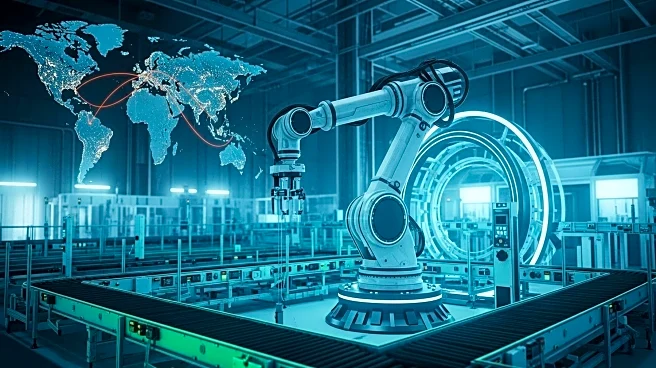What's Happening?
Manufacturers are increasingly turning to supply chain localisation as a strategy to mitigate risks associated with global disruptions such as geopolitical tensions, trade tariffs, and labor shortages. This shift involves not only moving production closer to home but also redesigning products, sourcing materials locally, and employing Industrial AI for scenario planning. Industrial AI is being utilized to simulate supply chain disruptions in real-time, allowing manufacturers to make faster and smarter decisions. The Environmental Protection Agency highlights remanufacturing as a key method to reduce environmental impact, as it minimizes raw material needs and transportation costs. Localisation also enhances ESG compliance by reducing emissions and improving supplier oversight.
Why It's Important?
The move towards supply chain localisation is significant as it addresses vulnerabilities exposed by recent geopolitical events, such as the Ukraine-Russia conflict and US trade tariffs. By shifting from 'just-in-time' to 'just-in-case' models, manufacturers can diversify their supplier networks and reduce dependency on single-source suppliers. This approach not only improves resiliency but also offers cost savings through reduced transportation expenses and tariffs. Industrial AI plays a crucial role in this transition by enabling proactive scenario planning and optimizing remanufacturing processes, which can lead to substantial improvements in supply chain performance.
What's Next?
Manufacturers are expected to continue investing in Industrial AI to further enhance their supply chain localisation efforts. This includes automating emissions calculations and embedding sustainability into daily operations. As companies strive to meet regulatory targets and consumer expectations for transparency, AI-driven data collection and analysis will become increasingly important. The focus will be on creating more resilient and responsive supply chains that can adapt to future disruptions, ensuring long-term business success.
Beyond the Headlines
The shift towards supply chain localisation and the use of Industrial AI could lead to broader changes in manufacturing practices, emphasizing sustainability and ethical considerations. As companies prioritize reducing their carbon footprint and improving supplier practices, this could drive a cultural shift towards more responsible business operations. Additionally, the integration of AI in scenario planning may redefine traditional supply chain models, making them more adaptable to unforeseen challenges.









